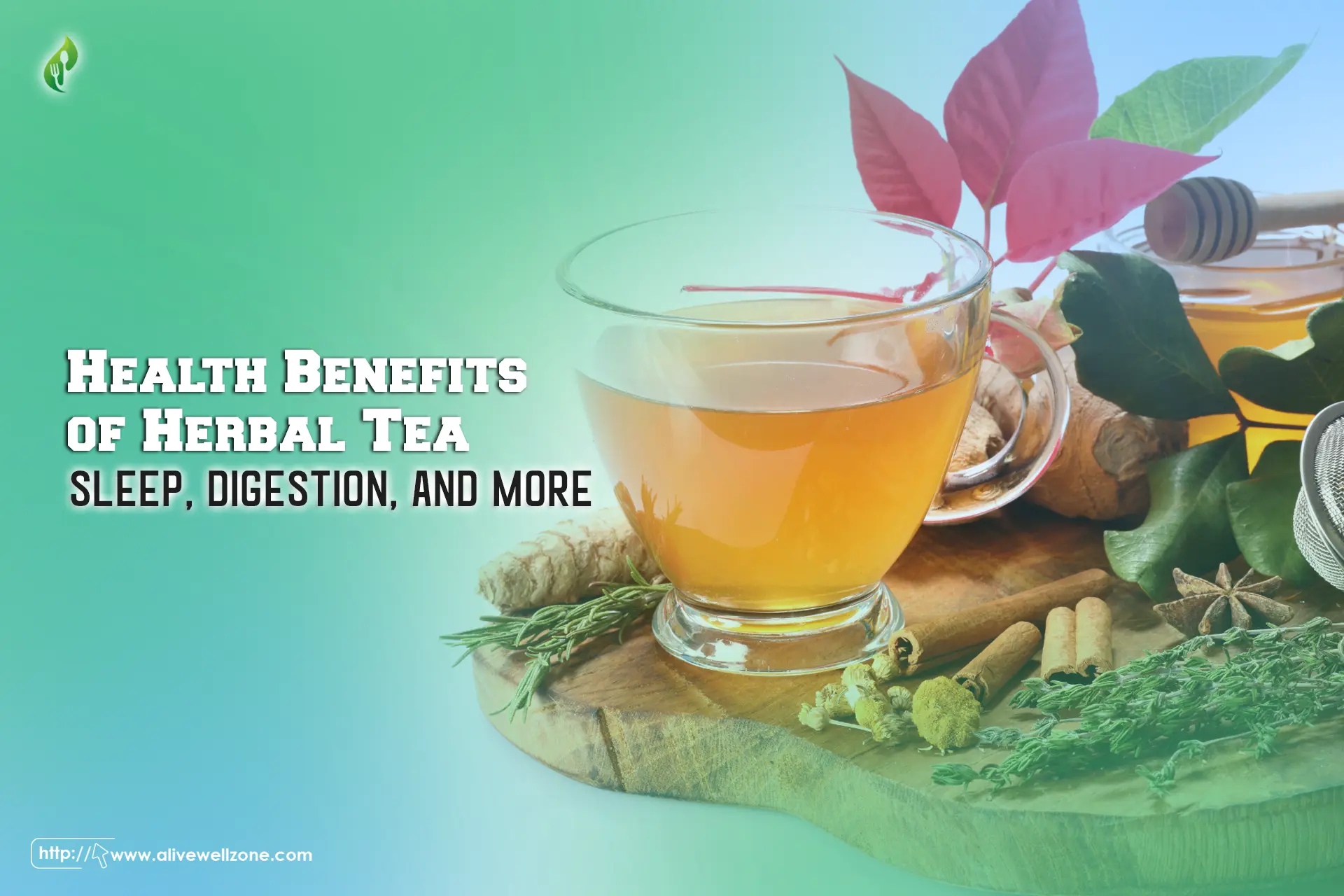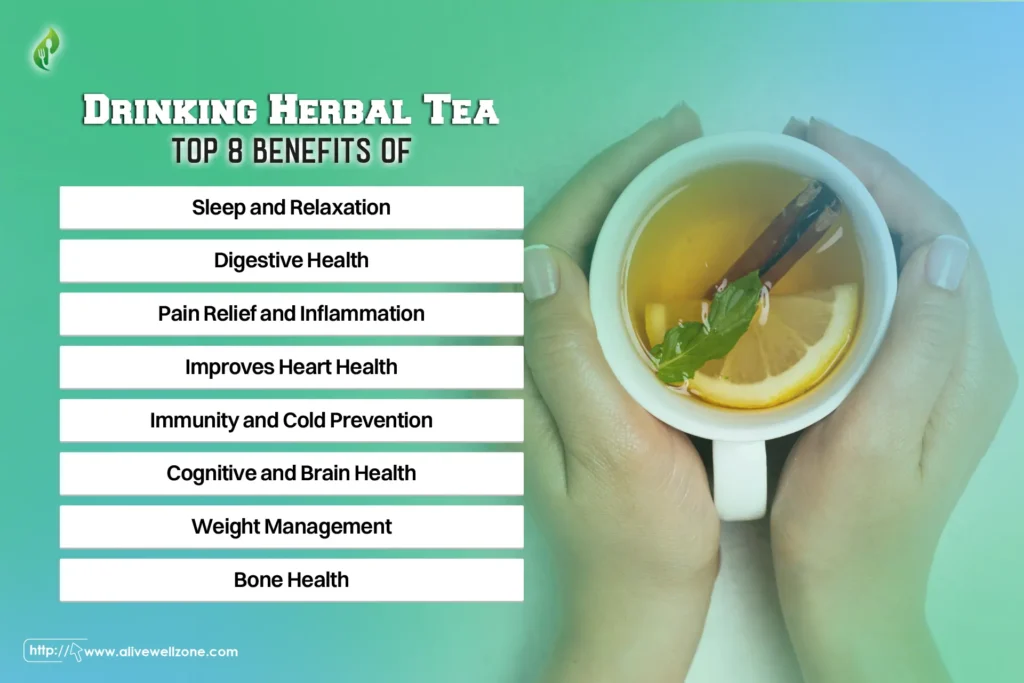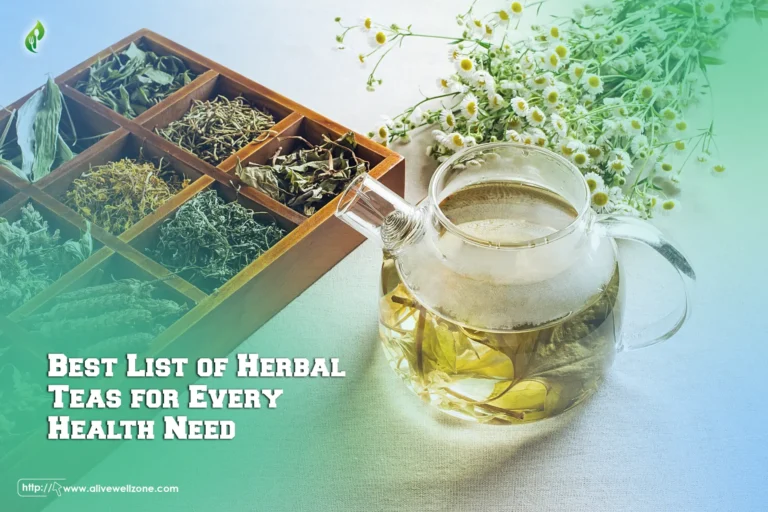
Last Updated on June 2, 2025 by Helena Akter
The health benefits of herbal tea go far beyond just relaxation! What if we told you that these natural brews can help improve your overall health? Whether you’re dealing with bloating, trouble sleeping, or mood swings, there’s an herbal tea with specific benefits to suit your needs.
Chamomile, ginger, dandelion, lemon balm, ashwagandha, rooibos, and hibiscus are popular herbal teas. And they’re known for promoting better sleep, digestion, pain relief, heart health, immune support, weight management, brain function, and stronger bones.
So, let’s go deeper into the wide-ranging health benefits of herbal teas. Ready to feel better, naturally?
Key Takeaways
- Support sleep and relaxation: Chamomile, lavender, and ashwagandha teas help reduce anxiety and improve sleep quality. They’re especially helpful for people facing sleep challenges like new mothers or those with chronic conditions.
- Improve digestion and reduce pain: Teas like ginger, dandelion, and barley aid digestion, reduce bloating, and relieve pain. Ginger, in particular, is known for its anti-inflammatory properties, helping with menstrual cramps and joint pain.
- Improve heart health and immunity: Rooibos and ginger teas may lower blood pressure, improve cholesterol levels, and support immune function. Chamomile and echinacea can also improve the immune system and help fight colds.
What are Herbal Teas?
Herbal tea, or tisane, is a drink you make by steeping plant parts like leaves, roots, flowers, seeds, and bark in hot water. They come in many flavors and you can enjoy them hot or cold.
Plus, these teas are caffeine-free, making them a good choice for people who are sensitive to caffeine or want to cut back on it. Not only do they taste good, but they can also be good for your health.
Top 8 Benefits of Drinking Herbal Tea
Different herbal teas and their benefits vary based on the herbs or plants you use. So, without taking any of your time let’s look at the benefits of herbal teas list.

- Sleep and Relaxation
Herbal teas can be a natural way to ease into restful sleep. For instance —
- To get the benefits of herbal tea in the morning you can try Chamomile tea. It has an antioxidant called apigenin. Basically, apigenin connects with brain receptors to minimize your anxiety and make you feel sleepy. Plus, research indicates it can help sleep, especially for older adults and new mothers who face sleep challenges.
- A study found that lemon balm can help people with chronic stable angina (CSA) sleep better. After taking lemon balm for eight weeks, people with CSA felt less depressed, stressed, and anxious, and had fewer sleep problems.
- A study showed that ashwagandha helped reduce anxiety, stress, and fatigue significantly. It also made people sleep better.
- A study of 80 new mothers in Taiwan showed that drinking one cup of lavender tea daily for two weeks, along with enjoying its smell, helped reduce fatigue and depression compared to those who didn’t. It’s a great option to enjoy the benefits of herbal tea before bed.
- Digestive Health
One of the health benefits of herbal tea is to make you feel less bloated and support a healthy digestive system.
- Barley is a good source of fiber, which helps you to prevent constipation and have regular bowel movements. For best results, drink a cup of barley tea before you eat.
- Dandelion tea might help regulate your bile, calm your stomach, and help in absorbing vital minerals.
- A study from 2019 suggests that ginger might reduce bloating and stomach cramps, and prevent gas and indigestion.
- A study in 2022 found that chamomile tea can help with stomach problems in several countries. For example, people in Spain said it helped them feel less nauseous, and people in Turkey said it helped with their stomach pain.
- Pain Relief and Inflammation
Different types of herbal teas and their benefits include reducing inflammation and relieving pain. Some of them are —
- Some studies suggest that ginger tea might be as helpful, or even more so, than store-bought pain relievers for menstrual cramps. But it’s best to drink it when your period starts.
- In addition to relaxation, chamomile tea has mild antibacterial and anti-inflammatory effects and may support liver health.
- Studies have shown that ginger contains compounds called shogaol and gingerol, which can help reduce inflammation. Plus, ginger has been specifically studied for its potential to relieve pain from knee osteoarthritis.
- Rosehip tea is rich in anti-inflammatory compounds, including galactolipids and polyphenols. Galactolipids, in particular, have been shown to have powerful anti-inflammatory effects and may help reduce joint pain.
- Improves Heart Health
Some herbal teas can support your blood circulation and overall cardiovascular wellness.
- An older study suggests that drinking rooibos tea may help lower blood pressure. This is because it may block a substance called ACE. Rooibos tea may also improve cholesterol levels, increase antioxidants, and lower blood sugar in both healthy and at-risk people.
- Research shows that eating 2 to 6 grams of ginger every day might help prevent heart problems like heart attacks, heartburn, and blood clots.
- A small study found that drinking lemon balm tea for six weeks can help improve blood vessel stiffness. It’s important because stiff blood vessels can increase the risk of heart problems, strokes, and cognitive decline.
- Some studies suggest that chamomile might help lower the risk of heart disease, and protect against certain types of cancer.
- Immunity and Cold Prevention
Drinking some herbal teas may help strengthen your defenses and could aid in preventing seasonal colds.
- Some studies suggest that echinacea tea might help strengthen the immune system. This could make it easier for the body to fight off infections.
- Ginger is packed with essential nutrients like iron, magnesium, vitamins B6 and C, and zinc that can boost your immune system. Gingerol, a substance in ginger, can help soothe cold symptoms like sore throats and muscle aches. It can also fight flu symptoms.
- Research shows that chamomile tea has an antiviral and antibacterial nature. This might help your immunity and fight off colds and other common illnesses.
- Research suggests that every part of the dandelion plant has substances that can help protect cells from damage and reduce inflammation. Since inflammation can contribute to many health problems, drinking dandelion tea might help lower your risk and improve your overall well-being.
- Cognitive and Brain Health
The following are a few herbal teas that may help with focus, memory, and cognitive wellness over time.
- Scientists have found that ginger might help protect the brain from damage caused by oxidative stress and inflammation. These two things are linked to diseases like Alzheimer’s.
- Cinnamon tea might help your brain work better by stopping a protein called Tau. This protein can cause problems like Alzheimer’s and Parkinson’s.
- Several studies have shown that consuming different types of sage extract can improve mental function and memory in healthy adults. So, you can easily make herbal tea using sage extract and enjoy the health benefits of herbal tea.
- Some animal and test-tube studies have shown that the chemicals in rosemary tea might help protect your brain by stopping brain cells from dying.

- An older study from 2022 found that lemon balm might improve cognitive and memory function, even if they don’t have Alzheimer’s disease.
- Ginkgo biloba tea is known to improve blood flow to your brain. That way, it improves your cognitive functions such as concentration and memory. Plus, it’s often used to support focus and mental clarity, especially in older adults.
- Weight Management
Many people drink Herbal tea to stay healthy and manage their weight.
- Recent Korean studies compared dandelion root to weight loss drugs like Orlistat. They found that dandelion root has similar properties that might help with weight loss.
- Many studies have found that cinnamon can help people lose weight at home, especially around their stomachs. But remember that these studies were done with people who controlled their calorie intake. So it might not be as easy to lose weight with cinnamon in everyday life.
- Barley tea has antioxidants like vanillic acids and chlorogenic. These may help you lose weight by increasing the amount of fat your body burns when you’re not active.
- Hibiscus might help with weight loss by stopping the body from making a specific enzyme called amylase. This enzyme helps to break down carbohydrates, so if it’s less active, your body might absorb less sugar and starch, which could lead to weight loss.
- A study found that people who took ashwagandha lost weight, gained more muscle strength, and had lower cholesterol.
- Bone Health
Regular consumption of certain herbal teas could help in maintaining strong bones as part of a balanced diet.
- Just one cup of dandelion greens has over 500% of the vitamin K you need each day. Studies show that vitamin K might help keep your bones strong and lower your risk of broken bones. It’s especially effective for women who’ve gone through menopause and might have osteoporosis.
- Barley tea is packed with minerals like magnesium, phosphorus, calcium, zinc, and iron. So, drinking barley tea, which is rich in minerals, might help prevent osteoporosis.
- Ceylon cinnamon is a good source of manganese, a mineral that helps your body make hormones and repair bones.
- Rooibos tea is rich in minerals like manganese, calcium, and fluoride. These minerals can help keep your bones and teeth healthy and strong. Calcium is important for building strong bones whereas manganese helps form bones and keeps them strong.
Final Words
In short, the health benefits of herbal tea are more than just helping you relax. Whether you’re looking to improve sleep, aid digestion, relieve pain, or boost your immunity, there’s herbal tea for you.
From chamomile to ginger, these natural brews offer simple, caffeine-free ways to improve your overall well-being. As we learn more about herbs, herbal teas are becoming a popular choice for everyday health needs.
Try different herbal teas and see how they can help you feel better!
FAQs
Is herbal tea gluten free?
Herbal teas are often gluten-free, but some may contain barley or other gluten grains. Barley can be mixed with tea leaves or used alone, so always check labels carefully for ingredients like barley, rye, or malt.
Is herbal tea a laxative?
Yes, some herbal teas like senna or cascara work as natural laxatives and may relieve constipation. However, they vary in strength, and frequent use isn’t always safe. If constipation persists, it’s best to consult a doctor.
Is herbal tea good before bed?
Yes, it’s good to drink herbal tea before bed. They don’t have caffeine which is one of the best benefits of drinking herbal tea before bed so they won’t keep you awake. Peppermint and chamomile teas are good choices because they can help you feel calm and relaxed.
Is herbal tea good for your skin?
Yes, herbal teas like spearmint and peppermint can benefit your skin. The menthol in them helps to balance your hormones and make your skin less oily. It can help your skin cells renew themselves and get rid of dead skin. All of this can make your skin look clearer and brighter.







